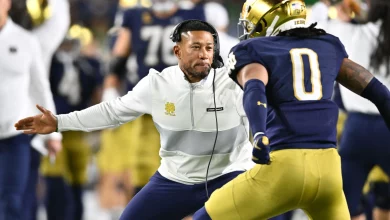‘Unfortunate’ Message From Oilers Coach Regarding Stuart Skinner’s Choice.

]In the unforgiving spotlight of the Stanley Cup Final, every coaching decision carries immense weight, magnified by the hopes of millions and the razor-thin margin between victory and defeat. On June 12, 2025, Edmonton Oilers head coach Kris Knoblauch faced one such moment during Game 4 against the Florida Panthers: the difficult call to pull starting goaltender Stuart Skinner after conceding three goals in the opening period.
Knoblauch described the decision as “unfortunate” — a word that, on the surface, softens the blow but reveals the complex pressures inherent in managing elite athletes in a pressure cooker environment. This article dives into that message, exploring the context, the coach’s intent, Skinner’s response, and the broader ramifications for the Oilers’ playoff journey.
Setting the Stage: The High-Stakes Pressure Cooker of the Stanley Cup Final
The Stanley Cup Final is no ordinary hockey series. Every decision is dissected, every play scrutinized under the microscope of fans, media, and analysts. Coaches know this better than anyone, especially when it comes to the most critical position: goaltender.
For the Edmonton Oilers, Stuart Skinner had been a beacon of promise throughout the regular season — a young, agile, and technically sound netminder tasked with anchoring the team’s playoff hopes. Yet playoff hockey is a different beast, a place where margins are minuscule, and the mental game reigns supreme.
When Skinner allowed three goals on 11 shots in the first period of Game 4, the Oilers found themselves in a dire position. The game was slipping away, and the momentum was decidedly in Florida’s favor.
The Decision to Pull Skinner: Tactical Necessity or Tough Message?
Coach Kris Knoblauch’s choice to remove Skinner was met with mixed reactions. To some, it was a necessary tactical move — an attempt to “shake things up” and shift the game’s momentum by inserting backup goalie Calvin Pickard. To others, it felt harsh, especially given Skinner’s status as a rising star and the immense pressure weighing on his shoulders.
When asked about the decision after the game, Knoblauch labeled it “unfortunate,” a deliberate choice of words that struck a balance between candidness and support.
“It was an unfortunate situation for Stuart,” Knoblauch said. “We all want him to succeed, and he’s shown a lot of promise all year. But sometimes in these moments, you have to make a decision based on the flow of the game and what the team needs.”
By framing the move as “unfortunate,” Knoblauch aimed to avoid publicly assigning blame or damaging Skinner’s confidence while underscoring the urgency of the situation.
The Nuances of Coaching: Managing Strategy and Morale
Pulling a starting goalie in the playoffs is never just about numbers or stats. It is an emotional, psychological decision that tests a coach’s leadership skills. Skinner’s situation is emblematic of the delicate balancing act coaches perform — making the right tactical choice while safeguarding player morale.
Knoblauch’s message highlights this challenge. He needed to communicate clearly that the decision was about the team, not a personal indictment of Skinner.
“It’s never easy, especially with a guy like Stuart who’s worked so hard and is such a big part of this team’s future,” Knoblauch noted. “But at the same time, you have to be honest with the team about what’s happening and what we need in the moment.”
This type of communication is critical in playoff hockey, where a team’s psychological resilience often determines outcomes.
Stuart Skinner’s Reaction: Professionalism Under Pressure
Skinner himself responded to the decision with maturity and grace, understanding the stakes and the nature of playoff hockey.
“I’m obviously disappointed,” Skinner admitted in his postgame comments. “But I get it. These things happen in the playoffs. I’m going to learn from it and come back stronger. That’s all I can do.”
Such professionalism reflects Skinner’s growth as a player and a person. Instead of dwelling on the setback, he focused on improvement and trust in his teammates and coaching staff.
His response also reinforces why Knoblauch chose the word “unfortunate” — to protect Skinner’s confidence and keep him engaged for the battles ahead.
Team Dynamics: A Collective Responsibility
Leadership within the Oilers locker room has been vital during these playoffs. Veterans like Connor McDavid and Leon Draisaitl have stepped up not just on the ice but as emotional anchors, helping manage the ups and downs that come with a deep playoff run.
McDavid, speaking about the goalie change, emphasized the team’s collective responsibility.
“We win and lose as a team. Stuart’s been great for us all season, and we’ve got his back. We knew we had to respond, and everyone did their part tonight.”
This solidarity is key to maintaining cohesion and ensuring that individual challenges don’t fracture the group.
Broader Playoff Implications: What This Means for Edmonton’s Goaltending
The goaltending situation remains a focal point of the Oilers’ playoff narrative. Skinner’s struggles in the playoffs contrast with his strong regular-season performance, creating a tension that the coaching staff must navigate carefully.
The decision to pull him in such a crucial moment raises questions: Will the Oilers continue to trust Skinner as their starter? Will Pickard see more time?
For now, Knoblauch appears committed to Skinner but is clearly weighing options.
“We have two capable goalies,” Knoblauch said. “Our job is to put the team in the best position to win every night.”
This measured approach indicates flexibility and adaptability — traits essential in postseason hockey.
The ‘Unfortunate’ Word: More Than Just Sympathy
Knoblauch’s choice of the word “unfortunate” resonates beyond its simple definition. It conveys empathy, acknowledges difficulty, and opens a path forward without casting blame.
It’s a diplomatic way to handle a high-pressure situation that could otherwise undermine trust and morale.
By not labeling the move as a failure or punishment, Knoblauch keeps Skinner’s confidence intact while signaling the team’s need for immediate results.
Historical Context: Goalie Pulls in Playoff History
Historically, pulling a goalie early in a playoff game is rare and often a sign of desperation or a strategic gamble. Coaches like Scotty Bowman, Al Arbour, and Joel Quenneville have all made similar decisions — some successful, some controversial.
Knoblauch’s decision fits this tradition: a bold move intended to stop the bleeding and spark a comeback.
Whether it ultimately pays off in this series remains to be seen, but the reaction from players, media, and fans underscores how pivotal these moments are in defining legacies.
Looking Forward: The Road Ahead for Skinner and the Oilers
The series is far from over. Edmonton has shown resilience and the ability to rally under pressure. For Skinner, this moment may become a defining one — a chance to prove his mettle in the crucible of playoff hockey.
Coach Knoblauch’s “unfortunate” message is as much a challenge as it is a reassurance: a reminder that setbacks are part of the journey but not the end.
If Skinner can bounce back, the Oilers will have the goaltending stability they need to chase their first Stanley Cup in over three decades.
In the relentless arena of the Stanley Cup Final, coaching decisions are scrutinized intensely. Kris Knoblauch’s choice to pull Stuart Skinner was tough but necessary — and his message afterward carefully calibrated to balance honesty with support.
The word “unfortunate” encapsulates this complexity: an acknowledgment of disappointment paired with hope for redemption.
As the Oilers continue their playoff run, the true measure of leadership and character will be how the team and Skinner respond — both on the ice and off.
For now, Knoblauch’s message serves as a reminder that in hockey, as in life, sometimes the hardest decisions are the ones that define us most









